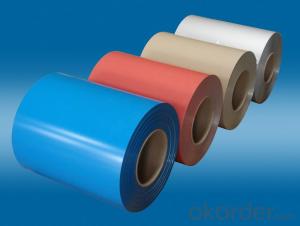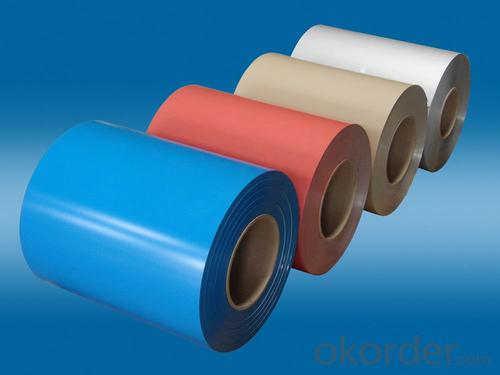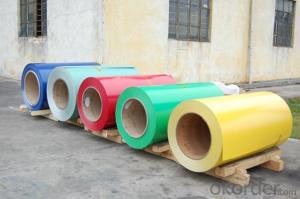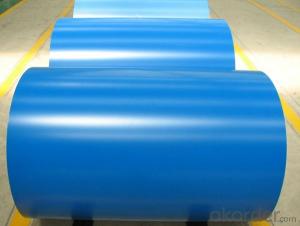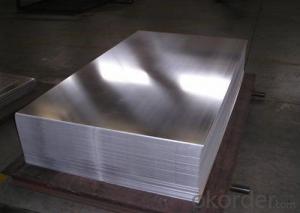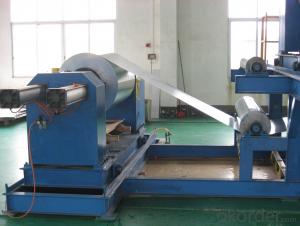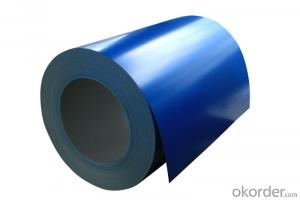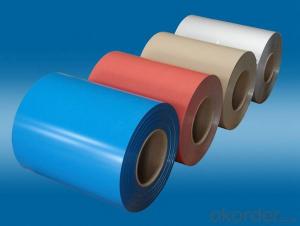5052 Color Coating Aluminum Coil for Wall System
- Loading Port:
- Shanghai
- Payment Terms:
- TT OR LC
- Min Order Qty:
- 5 m.t.
- Supply Capability:
- 10000 m.t./month
OKorder Service Pledge
OKorder Financial Service
You Might Also Like
Specification
1. Specification of Color Coating Aluminum Coil for Wall System
Material | Alloy Aluminum 6063,6061,6005 or customer nominated |
Temper | T3, T4, T5, T6 |
Surface | Anodize, electrophoresis, powder coating, PVDF coating, wood grain painting, matted, etc. |
Colour | Any colour based on Standard Germany RAL Mark |
Length | Coating 6.5 meters, Anodizing 6.5 meters, Mill finish 5 meters |
Press Machine | 500-4000 tons all together 64 press lines. |
Fabrication | 1. Windows and doors; 2. Drilling; 3. Bending; 4. Cutting; 5. etc. |
Certificate | ISO 9001 |
Moulding | 1. Using our moulds, no fee; |
2. Using customer drawing, opening mould, usually about 10~50 tons then the moulding can be refunded. | |
3. Mould cost is negotiable base on the order quantity | |
Capability | Annual output 100,000 tons |
2. Application of Color Coating Aluminum Coil for Wall System
(1).Interior: wall cladding, ceilings, bathrooms, kitchens and balconies, shutters, doors...
(2).Exterior: wall cladding, facades, roofing, canopies, tunnels,column covers , renovations...
(3).Advertisement: display platforms, signboards, fascia, shop fronts...
3. Feature of Color Coating Aluminum Coil for Wall System
*Such coil is specially designed to replace aluminum ingot, due to the high export tax of aluminum ingot, the coil has better price than ingot.
*This type of coil can fit customer's remelting furnace just like ingot, no need to make any change to the production line that was previously used for ingot. The standard coil size and weight is very suitable for the feed gate of furnace.
*This type of coil causes less material wastage than ingot when remelted.
*Our coil is made directly from ore, no need to go though the ingot making process, quality is much better than other suppliers who use ingot scrap to make coil.
Be free from Oil Stain, Dent, Inclusion, Scratches, Stain, Oxide Dicoloration, Breaks, Corrosion, Roll Marks, Dirt Streaks and other defect which will interfere with use
4. Certificate:
SGS and ROHS(if client request, paid by client), MTC(plant provided), Certificate of Origin(FORM A, FORM E, CO), Bureau Veritas and SGS (if client request, paid by client), CIQS certificate
5. Image of Color Coating Aluminum Coil for Wall System
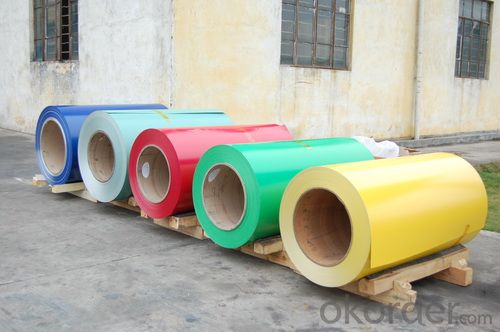
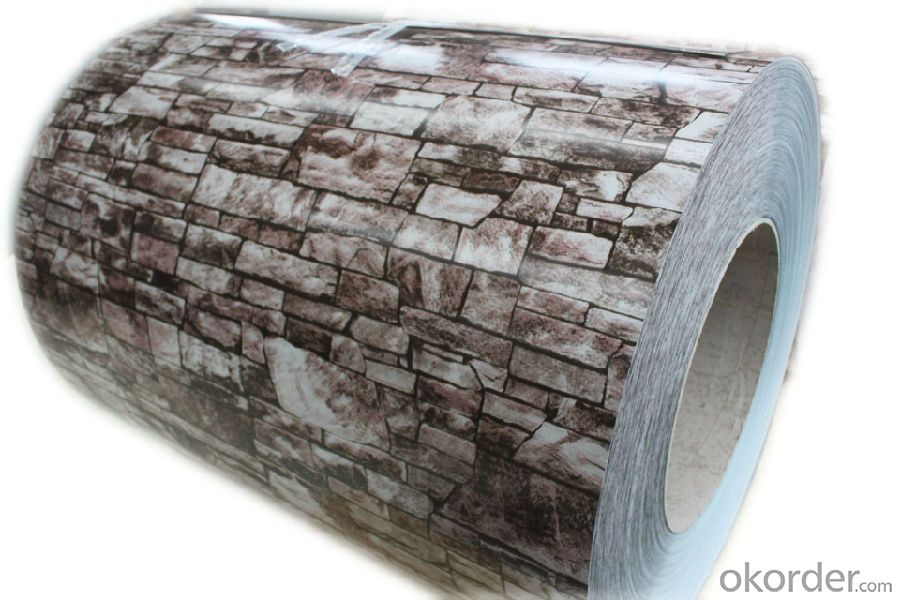
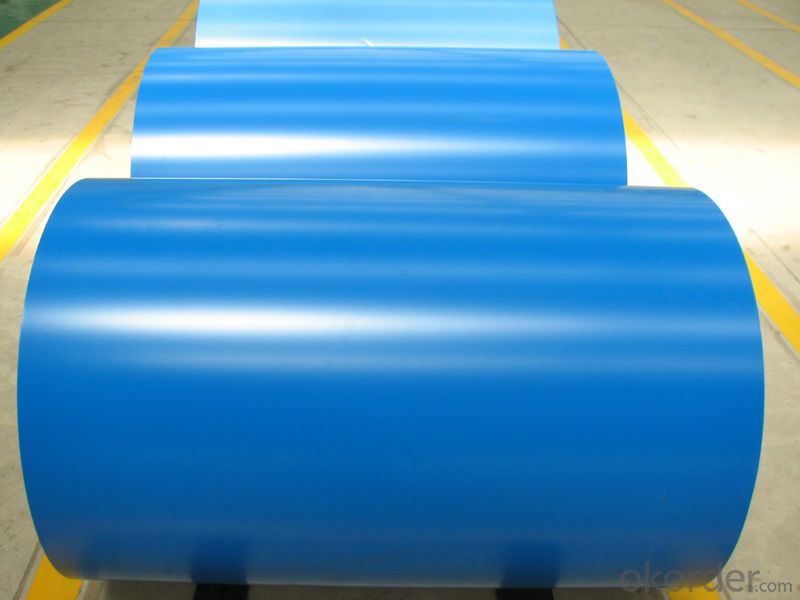
6. Package and shipping of Color Coating Aluminum Coil for Wall System
eye to wall
eye to the wall
with wood pallet (wooded case also available)
7. FAQ
1) What is the delivery time?
Dpends on actual order, around 20 to 35 days
2)What is the QC system:
We have QC staff of 20 persons and advanced equipment, each production is with MTC traced from Aluminum ingot lot.
3) What market do you mainly sell to?
Australia, America, Asia, Middle East, Western Europe, Africa etc
- Q: What is the mass of 3.45 moles of Aluminum sulfate?Can u explain how?
- Aluminum sulfate is Al2S3, so you got two atoms of aluminum and three of oxygen. Hence the molar mass of aluminum sulfate is: 2X16 (two times molar mass of oxygen) + 3X32 (three times molar mass of sulfur). Keep in mind that the molar mass of an elements equals its mass number. We have 128 grams per mole or 128 pounds per lb-mol. Since you have 3.45 moles of Al2S3 you just have to do 3.45 times 128 = 441.6 grams
- Q: Are aluminum coils suitable for marine environments?
- Due to their excellent corrosion resistance properties, aluminum coils are well-suited for use in marine environments. One of the reasons for this is that aluminum naturally develops an oxide layer on its surface, which acts as a protective barrier against saltwater corrosion. Consequently, aluminum coils demonstrate a high level of resistance to rust and deterioration caused by exposure to marine conditions. Furthermore, the lightweight nature of aluminum makes it an ideal choice for marine applications where reducing weight is crucial. Moreover, aluminum coils possess good thermal conductivity, which is advantageous for dissipating heat in marine cooling systems. All in all, aluminum coils are a dependable and durable option for marine environments, guaranteeing long-lasting performance and minimal maintenance needs.
- Q: How are aluminum coils used in the production of consumer electronics?
- Aluminum coils are commonly used in the production of consumer electronics for various purposes such as heat dissipation, electrical conductivity, and structural support. They are often found in devices like laptops, smartphones, and televisions, where they help in maintaining the temperature of internal components, ensuring efficient performance. Additionally, aluminum coils are used in circuit boards and connectors to facilitate the flow of electricity and enhance conductivity. Their lightweight nature and corrosion resistance make them ideal for consumer electronic applications.
- Q: What is virgin aluminum? I can't find anything about it, is it just another word for aluminum? Is there a difference?
- Aluminum that contains no recycled aluminum.
- Q: How are aluminum coils tested for flatness?
- Aluminum coils are typically tested for flatness using a variety of methods, including visual inspection, mechanical measurement, and advanced technologies like laser scanning. The visual inspection involves examining the surface of the coil for any visible signs of waviness or distortion. Mechanical measurement techniques involve placing the coil on a flat surface and using specialized tools to measure its flatness by checking for any deviations from the ideal flat plane. Laser scanning is another method where a laser beam is directed across the surface of the coil, and the reflected beam is analyzed to determine the flatness of the coil. These testing methods ensure that aluminum coils meet the required flatness standards for their intended applications.
- Q: How are aluminum coils protected during shipping?
- Aluminum coils are typically protected during shipping by being wrapped in a layer of protective film or paper, secured with strapping or bands, and then placed on pallets or in crates. Additionally, they may be enclosed in metal or wooden containers to provide further protection against external damage during transit.
- Q: Can aluminum coils be used in solar energy systems?
- Yes, aluminum coils can be used in solar energy systems. Aluminum is a commonly used material in the construction of solar panels and other components due to its lightweight, corrosion resistance, and excellent thermal conductivity properties. It is often used as a conductor in the wiring of solar panels and can also be found in heat exchangers and solar water heaters.
- Q: What are the various applications of aluminum coil in the construction industry?
- <p>Aluminum coil is widely used in construction for various purposes due to its lightweight, durability, and corrosion resistance. It is commonly used in roofing and siding materials for both residential and commercial buildings, providing a long-lasting and low-maintenance option. Aluminum coil is also utilized in the manufacturing of window frames and doors, offering thermal efficiency and strength. Furthermore, it is used in the production of heat exchangers, solar panels, and electrical wiring due to its excellent conductivity. Additionally, aluminum coil is employed in the fabrication of scaffolding and structural components, contributing to the overall stability and safety of construction projects.</p>
- Q: Explain the distinction between aluminum coil and copper coil, highlighting their properties and uses.
- <p>Aluminum coil and copper coil are both metal coils used in various industries, but they have distinct properties. Aluminum coil is lighter, more corrosion-resistant, and less expensive than copper coil. It is often used in applications where weight and cost are concerns, such as in construction and electrical wiring. Copper coil, on the other hand, has superior electrical conductivity and is more ductile, making it ideal for electrical applications where high conductivity is required, such as in power transmission cables and wiring for electronics. Copper is also used in plumbing due to its resistance to corrosion. In summary, the choice between aluminum and copper coil depends on the specific requirements of the application, including factors like conductivity, weight, cost, and resistance to corrosion.</p>
- Q: I am looking for a deoderant that doesn't contain aluminum that actually works. I have tried Tom's natural deoderant and didn't get to use it long enough to see if it worked because it really irritated my skin and caused it to burn and peel. I have also tried the one made by Adidas and it seemed to work pretty well through the winter months, but now that it is getting warm again I'm noticing that it isn't quite doing the job anymore.
- aluminum zirconium is the chemical that makes you stop sweating, not that it works on most people. they can only put a certain percentage of it in deodorants, try the degree clinical, i just started using it and it seems to be doing okay, good luck i know what you are going through.
Send your message to us
5052 Color Coating Aluminum Coil for Wall System
- Loading Port:
- Shanghai
- Payment Terms:
- TT OR LC
- Min Order Qty:
- 5 m.t.
- Supply Capability:
- 10000 m.t./month
OKorder Service Pledge
OKorder Financial Service
Similar products
Hot products
Hot Searches
Related keywords
